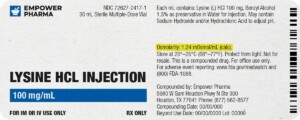The Lipo-B (MIC) injection is a product that contains a combination of compounds that have been shown to exhibit lipotropic effects. The lipotropic effects facilitate the burning of adipose tissue within the human body which may, consequently, result in some degree of weight loss. Lipo-B injections are typically used as fat loss supplements, in combination with diet and exercise, in weight loss plans. The combination of products that make up the Lipo-B (MIC) injection are methionine, choline, and cyanocobalamin (vitamin B12).
Methionine
Methionine is one of the four sulfur-containing amino acids; the other three are cysteine, homocysteine, and taurine. Additionally, it is one of the nine essential amino acids in the human body. As an essential amino acid, it cannot be synthesized de novo by the human body due to a lack of the require metabolic pathway needed for its synthesis. Therefore, methionine has to be exogenously introduced into the human body either within the diet or as a supplement.[1][2]
Methionine serves several key roles in the human body such as:
Substrate in the production of critical hormones and proteins including L-cysteine, carnitine, adrenaline, choline, and melatonin, among others.
Increasing liver production of lecithin which helps lower serum cholesterol levels.
Provides sulfur which aids development of nails and promotes hair growth.
Chelating agent which helps get rid of heavy metals such as mercury.
Provides protection against hepatotoxins such as acetaminophen.[3][4]
Choline
Choline is an essential nutrient that plays a key role in a number of metabolic pathways in the human body. Even though choline is produced endogenously in the liver, it is still considered an essential nutrient because the quantities produced is not sufficient to meet the body’s metabolic needs; as such, dietary supplementation of choline is necessary. Choline can be found in both animal and plant food sources, with animal food sources generally having more choline per gram of food product.
Some functions that choline serves in the body are:
Production of sphingomyelin and phosphatidylcholine, which are needed to maintain cell membrane integrity.
Production of acetylcholine, which is one of the major neurotransmitters in the body.
Modulation of gene expression and cell membrane signaling.
Early brain development in fetuses.[5][6]
Cyanocobalamin
Otherwise known as vitamin B12, cyanocobalamin derives its name from the fact that it has a cyanide group attached to its molecule and also contains the mineral cobalt. It is essential for cellular energy production as well as DNA synthesis. It is an essential water-soluble vitamin and must be obtained from food or as dietary supplements. Some good food sources of vitamin B12 are meat, fish, milk, eggs, and cheese, among others. Some of the roles that cyanocobalamin serves in the body include:
Cofactor for methionine synthase and L-methymalonyl-CoA mutase.
Synthesis of methionine from homocysteine.
Regeneration of tetrahydrofolate from 5-methyltetrahydrofolate.[7][8]



 Methylcobalamin Injection (Vitamin B12)
Methylcobalamin Injection (Vitamin B12) Cyanocobalamin (Vitamin B12) Injection
Cyanocobalamin (Vitamin B12) Injection Lipo Burn Capsules
Lipo Burn Capsules Bella Capsules
Bella Capsules 7-Keto DHEA Capsules
7-Keto DHEA Capsules Tirzepatide ODT
Tirzepatide ODT Hydroxocobalamin (Vitamin B12) Injection
Hydroxocobalamin (Vitamin B12) Injection Lisinopril Tablets
Lisinopril Tablets Metformin Tablets
Metformin Tablets Phendimetrazine Tartrate Tablets
Phendimetrazine Tartrate Tablets